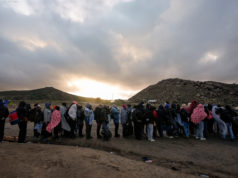Philippines president Rodrigo Duterte has approved the closure of the tourist destination of Boracay for up to six months, after saying the waters off its famed beaches had become a “ce
Philippines president Rodrigo Duterte has approved the closure of the tourist destination of Boracay for up to six months, after saying the waters off its famed beaches had become a “cesspool” due to overcrowding.
Mr Duterte approved the total shutdown of Boracay starting on April 26 in a Cabinet meeting after extensive discussions on the implications of a closure, including ways to help around 17,000 workers who may be displaced.
“This is not about profit, it’s about the political will to deal with years of neglect of the environment,”, tourism undersecretary Frederick Alegre said.
“We need to act swiftly to save the island and avert its further deterioration.”
Last February, Mr Duterte said Boracay’s water has turned into a “cesspool” with human waste being discharged into the sea.
More than 2 million tourists visited Boracay last year to enjoy its powdery beaches, spectacular sunsets and festive nightlife, generating about 56 billion pesos (£710,000) in revenue.
But the influx of tourists, neglected infrastructure and growth of resort establishments and poor settlements have threatened to turn Boracay into a “dead island” in less than a decade, according to a government study.
The island can only sustain 30,000 people but teems with 70,000 at any time, including 50,000 residents and daily arrivals of about 20,000 tourists, Mr Alegre said.
Hundreds of settlers have also illegally built homes and structures in forests and protected wetlands over the years, officials said.
Only about 47% of the hundreds of establishments are connected to the island’s main sewerage treatment plant, with many of the rest possibly maintaining crude septic tanks and others discharging their waste directly into the sea, Mr Alegre said.






